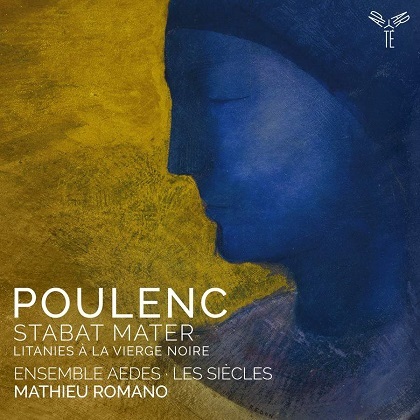This recent Marian-themed disc from the French record label Aparté brings together a trio of works by two composers four centuries apart: a single offering by the Renaissance Clément Janequin (1485-1558) and a pair of strikingly contrasting works by the 20th-century enfant terrible Francis Poulenc. It’s a coupling based on the assertion, according to the booklet writer Nicholas Southon, that Janequin ‘could be regarded as the great ancestor of the French choral tradition’.
The conductor Mathieu Romano believes Janequin was highly esteemed by Poulenc and considers there to be a possible double meaning to his three-minute chanson O doulx regard, O parler gratieux, suggesting the courtly love outlined within the anonymous text could be interpreted as ‘mankind’s love for the Virgin Mary’. With three credible motives for this pairing, why not add more Janequin, a composer famed for his vast body of chansons? At least this would have extended the disc’s meagre 50-minute duration. But this is to quibble, for the modern style rendition of his singular contribution is expressively sung by all 36 members of Ensemble Aedes – a professional ensemble established in 2005. Elsewhere, the group along with organist Louis-Noël Bestion de Camboulas and Les Siècles deliver exceptional performances.

The disc opens with Poulenc’s Litanies à la Vierge Noire performed in its original version for three-part female voices and organ. It was conceived in 1936 after the death of a friend in a car crash, prompting a visit to Rocamadour and its chapel of the Black Virgin. From this encounter Poulenc said he was ‘once again drawn to the spiritual life’. Almost overnight his childhood faith was rekindled and within a week he completed his Litanies, later re-scoring it for voices, strings and timpani – a version seldom performed or recorded. The work’s spare textures and general austerity belies the notion that Poulenc was solely devoted to the artistic pursuit of sophisticated wit and lacking in sincerity and depth.
With numbers for the Litanies reduced to 18, Ensemble Aedes sing with exemplary tone, delivering outstanding blend and intonation. They are faithful to Poulenc’s performance directions and respond with suitable restraint when required to be humble et fervent and full-throated vigour for éclatant, a climatic passage when the text refers to the Virgin as protector of the medieval warrior, Roland. Even when quietly penitential, there’s nothing limp in the group’s singing. Such a polished sound as this might not have been envisaged by Poulenc when he claimed he wanted to depict the atmosphere of ‘peasant devotion’, wishing the work to be ‘sung simply and without pretension’.
A more opulent sound world inhabits his Stabat Mater (1951), a work richly scored for solo soprano, mixed choir and orchestra. Like the Litanies it was also triggered by the death of a friend, but here there’s a marked divide between its lyrical and dramatic qualities, its agony and ecstasy. Yes, the harmonic language is perfumed, even cloyingly sweet at times, but this performance unequivocally sharpens the paradox of grief and serenity; the choir, for example, are alternately red-blooded and delicate in ‘Sancta mater’. The intimacy of ‘O quam tristis’ is beautifully rendered, and choir and orchestra are splendidly emphatic in the raw emotions of ‘Quis est homo’. Christ’s torment and Mary’s suffering are graphically conveyed here in the passionate cries at ‘Et flagellis’, shocking in its visceral power, and the whole anchored by superbly alert instrumentalists from Les Siècles, with impressively agile brass playing cutting through the textures.
Hushed a cappella singing is finely balanced, characterised by a bright yet warm tone. Within orchestral passages, second basses are occasionally under projected, and one might wish for more imitative detail to emerge such as the tiny canons between sopranos and tenors in ‘Quando corpus’. But here the voices perfectly catch the stately processional that drives its closing pages – heartache has never sounded so sumptuous. Soprano soloist Marianne Crous is radiant in the sobbing rhythms of ‘Vidit suum’ and sails effortlessly over the high C flat in ‘Fac ut portem’ letting herself go with a wild abandon and creating a bewitching emotional impact.
In summary, this disc will be a treasured addition to existing Poulenc recordings and comes with excellent sound, full translations and scholarly booklet notes. Highly recommended.
David Truslove
Poulenc – Litanies à la Vierge Noire, Stabat Mater; Janequin – O doulx regard, o parler gratieux
Ensemble Aedes, Les Siècles, Marianne Crous (soprano), Louis-Noël Bestion de Camboulas (organ), Mathieu Romano director)
Aparté: AP323D [50:16]